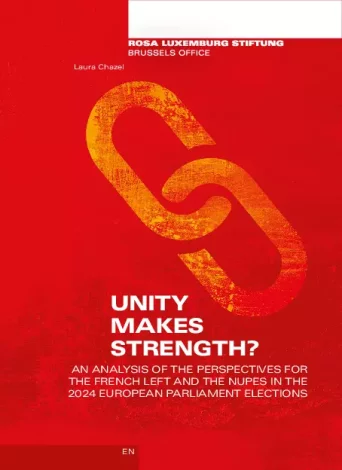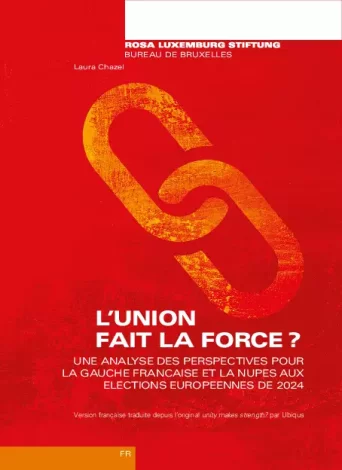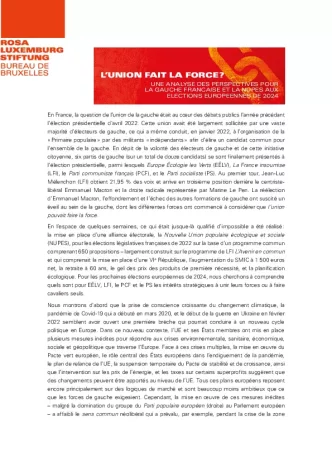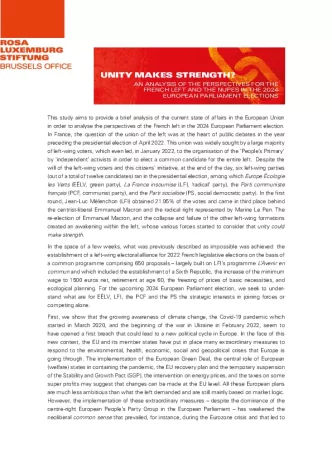Unity Makes Strength?
An analysis of the perspectives for the French left and the NUPES in the 2024 European Parliament elections
***Version française ci-dessous***
This study aims to provide a brief analysis of the current state of affairs in the European Union in order to analyse the perspectives of the French left in the 2024 European Parliament election. In France, the question of the union of the left was at the heart of public debates in the year preceding the presidential election of April 2022. This union was widely sought by a large majority of left-wing voters, which even led, in January 2022, to the organisation of the ‘People’s Primary’ by ‘independent’ activists in order to elect a common candidate for the entire left. Despite the will of the left-wing voters and this citizens’ initiative, at the end of the day, six left-wing parties (out of a total of twelve candidates) ran in the presidential election, among which Europe Écologie les Verts (EÉLV, green party), La France insoumise (LFI, ‘radical’ party), the Parti communiste français (PCF, communist party), and the Parti socialiste (PS, social democratic party). In the first round, Jean-Luc Mélenchon (LFI) obtained 21.95% of the votes and came in third place behind the centrist-liberal Emmanuel Macron and the radical right represented by Marine Le Pen. The re-election of Emmanuel Macron, and the collapse and failure of the other left-wing formations created an awakening within the left, whose various forces started to consider that unity could make strength.
In the space of a few weeks, what was previously described as impossible was achieved: the establishment of a left-wing electoral alliance for 2022 French legislative elections on the basis of a common programme comprising 650 proposals – largely built on LFI’s programme L’Avenir en commun and which included the establishment of a Sixth Republic, the increase of the minimum wage to 1500 euros net, retirement at age 60, the freezing of prices of basic necessities, and ecological planning. For the upcoming 2024 European Parliament election, we seek to understand what are for EÉLV, LFI, the PCF and the PS the strategic interests in joining forces or competing alone.
First, we show that the growing awareness of climate change, the Covid-19 pandemic which started in March 2020, and the beginning of the war in Ukraine in February 2022, seem to have opened a first breach that could lead to a new political cycle in Europe. In the face of this new context, the EU and its member states have put in place many extraordinary measures to respond to the environmental, health, economic, social and geopolitical crises that Europe is going through. The implementation of the European Green Deal, the central role of European (welfare) states in containing the pandemic, the EU recovery plan and the temporary suspension of the Stability and Growth Pact (SGP), the intervention on energy prices, and the taxes on some super-profits may suggest that changes can be made at the EU level. All these European plans are much less ambitious than what the left demanded and are still mainly based on market logic. However, the implementation of these extraordinary measures – despite the dominance of the centre-right European People’s Party Group in the European Parliament – has weakened the neoliberal common sense that prevailed, for instance, during the Eurozone crisis and that led to the implementation of austerity policies across the European continent. This new context can be seen by left-wing actors as a key moment for the re-articulation of cultural hegemony around new principles defended by their party family, and as an opportunity to impose their narrative in the public space. However, this new context does not imply the end of austerity policies and the end of the prevalence of market logic. We argue that the window of opportunity for the left exists but remains narrow and should therefore be seized quickly.
This new political cycle that could benefit the left does not mechanically imply that a programmatic alliance between the different left-wing forces is possible. For instance, in the French case, in February 2016, during the 2012–2017 five-year term of the socialist François Hollande (PS) – a period during which the PS became more ‘rightist’ by turning towards neoliberal solutions – Manuel Valls, then prime minister, put forward the idea of ‘irreconcilable positions’ between the left parties, suggesting at the time that no convergence was possible between the ‘left of the left’ (represented by Jean-Luc Mélenchon) and the social democratic left in terms of programmes and values. In this study, we seek to understand if genuine ‘irreconcilable positions’ between EÉLV, LFI, the PCF and the PS make a long-term coalition impossible.
Our analysis shows that over time, overall, the manifestos of EÉLV, LFI, the PCF and the PS increasingly converge on all dimensions: international, European, economic, environmental, social, cultural (see Graph 1). We have identified two key moments when these four parties moved further apart in programmatic terms, with a division between, on the one hand, EÉLV and the PS and, on the other, LFI and the PS: (1) the 2005 Treaty establishing a Constitution for Europe (TCE); (2) the liberal 2012–2017 five-year term of François Hollande.
We show that there has been a rapprochement between the four parties between 2006 and 2022, and that this rapprochement was accelerated after the five-year term of François Hollande. This rapprochement took place on cultural and societal issues; on democratic issues as all four parties aim to ‘radicalise’ democracy (Mouffe 2018) while remaining within the framework of liberal democracies; on environmental issues as left-wing parties have generally integrated these issues into their programmes well (Dalton 2009; Persico 2015), and especially with the recent ‘greening’ of radical left parties (Wang and Keith 2020). We also show that the divergences between the four parties that are often highlighted by the mass media and the mainstream press – such as the position towards the EU and NATO – are reflected rather little in the votes of the different MEPs of EÉLV, LFI, and the PS in the European Parliament during the last legislature.
We argue that the establishment of a NUPES government programme for the 2022 parliamentary elections can be seen as a key moment that closes the parenthesis of the left’s division on European issues opened in 2005, and of (part of) the left’s ‘liberal turn’ taken by François Hollande.
In the perspective of the 2024 European elections, a common programme, linking national and European issues, seems to be conceivable and strategically desirable for the left. As it was the case for the distribution of constituencies during the 2022 legislative elections between the different components of NUPES, the list for the European elections could be built considering the electoral results of the 2022 elections and the 2019 European elections. A common list would not necessarily imply the formation of a single group in the EP. As it is the case at the national level (each component of the NUPES has its own group in the National Assembly), at the European level, each party could sit in its own group but they could all work together on a shared agenda. This is even easier in the European Parliament, where no single group has a majority, and which has a stronger parliamentary culture than the National Assembly in France.
The 2024 programme for the European elections could be based on the votes in the EP during the last legislature and on the ‘European Union and international’ chapter of the shared government programme NUPES that could be further developed. Following the model of the NUPES in the 2022 legislative elections, a European programme could emphasise the need to disobey European rules if they conflict with the implementation of the programme. The programme could also propose the organisation of a ‘European Convention for the revision and rewriting of the European treaties’ in order to make EU rules compatible with the implementation of left-wing programmes both at European and national levels.
We also argue that, given the current tripartition of European party systems, an electoral alliance would be strategically desirable at the micro level (e.g. survival of the parties) and at the macro level (consolidation of a strong left-wing bloc capable of ‘storming heaven’) both in the short and long term. The rise of the far right across the European continent, coupled with the porous borders between the right and the far right at the level of the European Parliament, reinforces the need for joint work on the left of the hemicycle. Moreover, the renewal of the NUPES would provide voters with the necessary clarity and coherence to envision the implementation of more democratic, social and environmentally sustainable public policies both at the national and European levels.
Laura Chazel is a specialist of the European radical left. She is an associate researcher at Sciences Po Grenoble, a research fellow at the Research Institute for Sustainability of Potsdam, and a post-doctoral researcher at the Jagiellonian University of Krakow. She holds a PhD in political science from the University Grenoble Alpes (realised in co-direction with the University Complutense of Madrid). During her doctoral studies, she examined the theorization and practice of ‘populism’ by the French (LFI) and Spanish (Podemos) radical lefts. As a post-doctoral researcher, she now focuses on the German (Die Linke), Belgian (PTB) and Greek (Syriza) cases. More generally, she is interested in the mutations of the radical left over the last two decades, the emergence of new forms of protest that aim to ‘radicalise’ (liberal) democracy, the environmental discourse of the post-Marxist left, and the relationship between civil society movements and political parties.
Downloads
-
 Unity Makes Strength? An analysis of the perspectives for the French left and the NUPES in the 2024 European Parliament elections
Laura Chazel
Unity Makes Strength? An analysis of the perspectives for the French left and the NUPES in the 2024 European Parliament elections
Laura Chazel
-
 L'union fait la force? Une analyse des perspectives pour la gauche française et pour la NUPES aux élections européennes de 2024
Laura Chazel
L'union fait la force? Une analyse des perspectives pour la gauche française et pour la NUPES aux élections européennes de 2024
Laura Chazel
-
 L'union fait la force? Une analyse des perspectives pour la gauche française et pour la NUPES aux élections européennes de 2024 (résumé)
Laura Chazel
L'union fait la force? Une analyse des perspectives pour la gauche française et pour la NUPES aux élections européennes de 2024 (résumé)
Laura Chazel
-
 Unity Makes Strength? An analysis of the perspectives for the French left and the NUPES in the 2024 European Parliament elections (summary)
Laura Chazel
Unity Makes Strength? An analysis of the perspectives for the French left and the NUPES in the 2024 European Parliament elections (summary)
Laura Chazel
